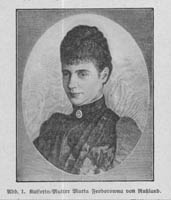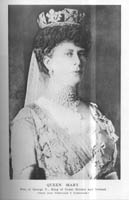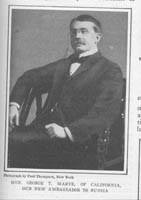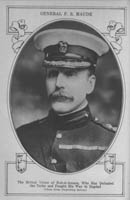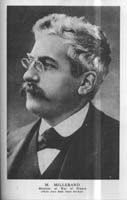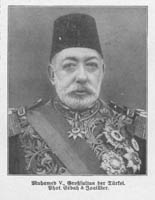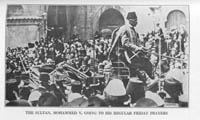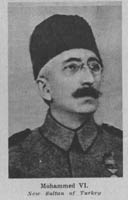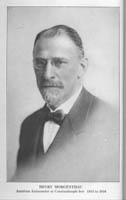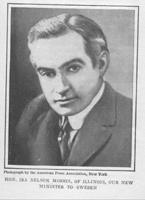Table of Contents
Key Figures
Statesmen
a | b | c | d-e | f | g | h-i | j-l | m | n-o | p | r | s | t-v | w-y
Tsarina Marie Feodorovna of Russia (1847-1928)
Empress of Russia from 1881 to 1894, she was born Princess Dagmar of Denmark in 1847. Her sister, Princess Alexandra of Denmark, married the future King George V of Britain. Dagmar was engaged to the Grand Duke Nicholas of Russia, but the Tsarevitch died of bronchitis. She instead married Nicholas' brother, Grand Duke Alexander, in November 1866 and became Marie Feodorovna. Marie Feodorovna became the Tsarina upon the death of Tsar Alexander II on March 13, 1881 as the result of an assassination. Marie Feodorornva was the mother of five children (three sons and two daughters), including Nicholas. Alexander III died of nephritis in November 1894 and her eldest son became Tsar Nicholas II. As the Dowager Empress, Marie Feodorvna devoted her energies in support of charity work. During World War I, she took a deep interest in prisoner of war affairs. Archibald Harte had an audience with the Dowager Empress in May 1915 as he sought permission for the American YMCA to begin War Prisoners' Aid operations for Central Power POW's in the Russian Empire. Marie Feodorovna supported this work and sent icons and religious texts to Russian prisoners of war in the Central Power Empires through the Association. When Nicholas II abdicated the throne in March 1917, the Dowager Empress went to the Crimea. The Sevastopol Soviet imprisoned Marie Feodorovna and a number of royal family members in October 1917, but German troops occupying the Crimea liberated the Romanovs in March 1918. With the Armistice in November 1918 and the withdrawal of German forces, Marie Feodorovna boarded a British warship and fled to Britain. She spent some time living in Copenhagen with her nephew, King Christian X of Denmark, but became a financial drain on his household. Her brother-in-law, King George V, invited her to England and provided her with a pension until her death in 1928.
K. E. Markel
Dr. Markel established the Prisoners of War Relief Agency (Kriegsgefangene Fürsorge) in England by early 1915. This organization was a social welfare agency to provide relief services for German POW's incarcerated in British prisons. The agency distributed clothing, tools, musical instruments, books, reading materials, and general supplies to German captives. Markel also remitted funds from the friends and families of prisoners. The organization eventually developed a marketing system which allowed prisoners to sell goods and handicrafts made in prison for extra income.
Queen Mary of Great Britain (1867-1953)
Born Princess Victoria Mary of Teck, she was the daughter of Franz Paul Karl of Württemberg, Prince of Teck, and Princess Mary Adelaide of Great Britain. Mary married George, Duke of York and heir apparent to the British throne, in 1893. During World War I, Mary was active in supporting relief services for British soldiers and sailors, including the English YMCA, and promoting the war effort. Mary served as the Queen Mother after her eldest son, George VI, became king in 1936.
George Thomas Marye (1849-1933)
An American statesman, Woodrow Wilson appointed Marye U.S. Ambassdor to Russia in 1914. Marye served in Petrograd during the disintegration of the tsarist empire. He actively supported American YMCA efforts to establish a War Prisoners' Aid program in Russia for Central Power POW's. He returned to the United States in 1916.
Sir Frederick Stanley Maude (1864-1917)
A British general, Maude commanded the 13th Division at Gallipoli during the failed Allied offensive against the Turkish Straits in 1915. After the Turkish capture of General Sir Charles Townshend in February 1916, the British High Command appointed Maude commander of the British Expeditionary Force in Mesopotamia. Maude resumed the Allied offensive along the Tigris River and recaptured Kut-al-Amara in February 1917. He continued to drive the Turks back and captured Baghdad in March 1917. Maude died suddenly of cholera in November 1917.
Alexander Millerand (1859-1943)
A French statesman, Millerand began his political life as a Socialist and served as the Minister of Commerce and Industry in 1899 and Minister of Public Works from 1909 to 1910. He broke ranks with the Socialists after calling out the army to suppress several railroad strikes in 1909. Millerand returned to government with the Conservatives and became the Minister of War from 1912 to 1915. The American YMCA negotiated with Millerand's ministry to gain access to Central Power prisoners of war in France during the early months of the war. Millerand became Premier in 1920 and was elected President of the Republic in September 1920. He resigned from the presidency in June 1924 and returned to the Senate where he remained until 1940.
Sultan Mohammed V of the Ottoman Empire (1844-1918)
Son of Sultan Abdul Medjid I of Turkey, Mohammed succeeded his brother, Abdul Hamid II, to the throne in 1909 after the Young Turks forced Abdul Hamid to restore the Constitution of 1876 and the Parliament deposed him. Mohammed was a weak ruler, which enabled the Young Turks to govern the empire. The Turks lost almost all of their European possessions to the Balkan League in the First Balkan War of 1912-1913. The Ottomans, however, regained Thrace by allying with Serbia, Greece, and Romania against Bulgaria in the Second Balkan War (1913). When World War I began in August 1914, both the Allies and Central Powers courted the Turks for support. The Ottomans negotiated a secret alliance with Germany and entered the war in November 1914. The Turks fought the Russians for control of Armenia and failed to dislodge the British from the Suez Canal. The Turks, however, successfully defended the Dardanelles from an Allied invasion and defeated a British army in Mesopotamia. The Turks implemented a genocide policy against the Armenians in 1915, which resulted in global condemnation. By the time of Mohammed's death in 1918, the British had advanced into Palestine and Mesopotamia.
Sultan Mohammed VI of the Ottoman Empire (1861-1926)
Son of Sultan Abdul Medjid I, Mohammed VI succeeded his brother, Sultan Mohammed V, upon the latter's death in 1918. While Turkish forces had advanced deep into the Caucasus as the result of the collapse of the Russian Army and the Treaty of Brest-Litovsk, the rest of the empire was crumbling as British forces advanced through Syria and Mesopotamia. After Bulgaria signed an armistice with the Allies in September 1918, the Turks followed suit and laid down their arms in October. The Allies occupied Constantinople and dismembered the Ottoman Empire. Mohammed VI remained Sultan while the Allies fought Turkish nationalist forces for control of Asia Minor. The Turkish Parliament finally deposed Mohammed in 1922.
Henry Morgenthau (1856-1946)
An American diplomat, Morgenthau was born in Mannheim, Germany and immigrated to the United States in 1865. He became a lawyer and practiced in New York City. President Woodrow Wilson appointed Morgenthau as U.S. Ambassador to the Ottoman Empire in 1913. When the Turks joined the Central Powers in November 1914, Morgenthau took over the diplomatic interests of many of the Allied Powers, including the care of prisoners of war. When the YMCA approached Morgenthau for support to establish War Prisoners' Aid operations for Allied POW's, Morgenthau strongly supported their objectives. He left Turkey in 1916 and became U.S. Ambassador to Mexico in 1920. Morgenthau later served as a technical expert for the U.S. delegation at the London Monetary and Economic Conference in 1933.
Ira Nelson Morris (1875-1942)
An American diplomat, Morris was the son of Nelson Morris, who established a large meat packing business in Chicago. President Woodrow Wilson appointed Morris as U.S. Minister to Sweden in 1914 and he served in Stockholm for nine years. During World War I, Morris was responsible for arranging conferences between the belligerents to address a variety of diplomatic issues, including the care and treatment of prisoners of war. Morris strongly supported the YMCA's mission to provide welfare assistance to POW's.
Dominic I. Murphy (1847-1930)
An American statesman, Murphy became a lawyer and served as the Commissioner to the United States Pension Office from 1896 to 1897. He was the editor and publisher of The New Century, a weekly journal, from 1903 to 1905 and then returned to government service as the Secretary of the Isthmian Canal Commission from 1904 to 1905. He entered the U.S. Diplomatic Corps when he became the U.S. Consul in Bourdeaux, France from 1905 to 1909. Murphy also served in St. Gall, Switzerland, from 1909 to 1914, and in Amsterdam, the Netherlands, from 1914 to 1915. The State Department assigned Murphy as the U.S. Consul in Sofia, Bulgaria from 1915 to 1917. While serving in Bulgaria, Murphy conducted official visits to inspect prison camps in the kingdom. He distributed funds to needy Allied prisoners and worked to improve their facilities, especially the easing of administrative restrictions. Murphy worked closely with the WPA Secretaries assigned to POW relief work in Bulgaria. Murphy served in his last diplomatic post in Stockholm from 1919 to 1922.
